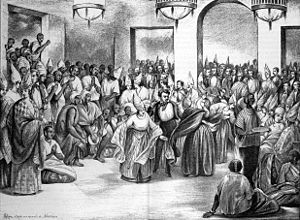You can help expand this article with text translated from the corresponding article in French. (January 2013) Click [show] for important translation instructions.
|


Signares were black and mulatto Senegalese women who had an influence via their marriage with European men and their patrimony. These women of color managed to gain some individual assets, status, and power in the hierarchies of the Atlantic slave trade.[1]
There was a Portuguese equivalent, referred to as Nhara, a name for Luso-African businesswomen who played an important part as business agents through their connections with both Portuguese and African populations.[2] There was also an English language equivalent of women of mixed African and British or American descent with the same position, such as Betsy Heard, Mary Faber, and Elizabeth Frazer Skelton.
- ^ Brooks, George (1976). The Signares of St. Louis and Gorée: Women Entrepreneurs in Eighteenth-Century Senegal. pp. 19–44.
- ^ George E. Brooks, Western Africa and Cabo Verde, 1790s–1830s: Symbiosis of Slave and ...